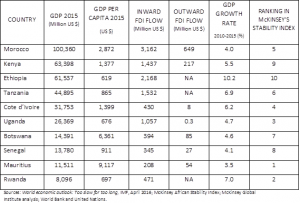Early this year, I wrote a post titled “‘Africa Rising’ – Under question?” The report McKinsey released last month “Lions on the move II: Realizing the potential of Africa’s economies” has brought the discussion back to the forefront: Africa is rising – no question about it. But Africa is not one country, one economy, one market: it’s 54 of them (or 53 if one doesn’t consider South Sudan – as McKinsey doesn’t).
Which are the countries rising in Africa? McKinsey includes in their report 30 countries accounting for 96 % of the continent’s 2015 GDP, and 87 % of the total population. 10 of these are classified as “stable growers.” This means that: (1) their real GDP growth rate is higher than the global average at 2.9 %, and (2) their stability is above the median in the MGI’s African Stability Index.

I thought it might be interesting to get some more information about the stable growers, so I did some search:
Economic development is one element in a country’s development path. But for it to lead to a country’s authentic progress, economic development must go hand-in-hand with social development. Based on my conversations with African business leaders, I think that’s clear in their minds. Keep it in mind if you’re thinking of starting operations there: the prosperity of your business in Africa is also linked to the promotion of socioeconomic development.
Any thoughts?



Thank you so much for bringing this discussion on your blog, Africa!
It is correct, (some) African countries are rising, economically! Based on the data you provided, East African countries in particular (Tanzania, Uganda, Rwanda & Kenya) are quite promising. Your message to potential investors wanting to invest on the continent is timely and appropriate.
While there’s some economic growth, levels of poverty and other elements of socioeconomic divide is also on the rise. This phenomena is certainly creating a new space of social mobilizations and anger against public costs (e.g. electricity, food, fuel, education, health) or a rising economy where the majority can’t afford it. (A foreign investor giving back to communities through CSR may be caught in the middle or being forced to provide social goods to the public where the state/government has failed or simply does not pay much close attention to do so).
Given my knowledge of the East African countries, I am currently very impressed by Tanzania and Rwanda’s economic growth, but more importantly, their effort to invest in various socioeconomic areas. They are aware that their economy can sustainably continue to grow and prosper only when the masses’ essential need are met (e.g. affordability, jobs, health, education etc…).
How? in order to ensure that their economic growth equals socioeconomic needs., these governments are fighting the most institutional scourge in their countries ( and the continent) … which is to do with corruption (and the existence of “ghost workers”). Corruption & the number of ghost workers in Tanzania, for example, had reached at an alarming level. The current leadership is fighting it harder, strengthening institutions (e.g. court system) and also ensuring that public, private and foreign firms pay taxes. While fighting corruption, these countries are striving to ensure that they collect enough domestic revenues to support the public sector and minimizing dependence on foreign aid. For example, older people in both countries can now receive free health services; primary and secondary education is free … thus, enabling children from all socioeconomic background to attend primary, second and tertiary education etc…. This is the kind of an environment a foreign investor would like to hear 🙂
Thanks again,
Aloys
Aloys, thank you for sharing these insights with us. It’s very true that the reality behind the numbers can be very differnt for different groups of people, and that fighting corruption is of essence to make basic goods and services available to everyone — and this is the type of development that will make the continent prosper.
Thanks for all of your contributions to this blog!
I really enjoy reading your blog, Africa! You often bring forward some interesting IB/strategy topics that are hard to avoid or write a comment! Thank you!
Thanks again, Aloys!
Very good article! This makes me want to read the rest of the articles related to Africa and expect lots of new ones.
Thank you, Andra Baughman! I’m glad you like it.
Thank you for your article! It’s really important give some visibility to african students.